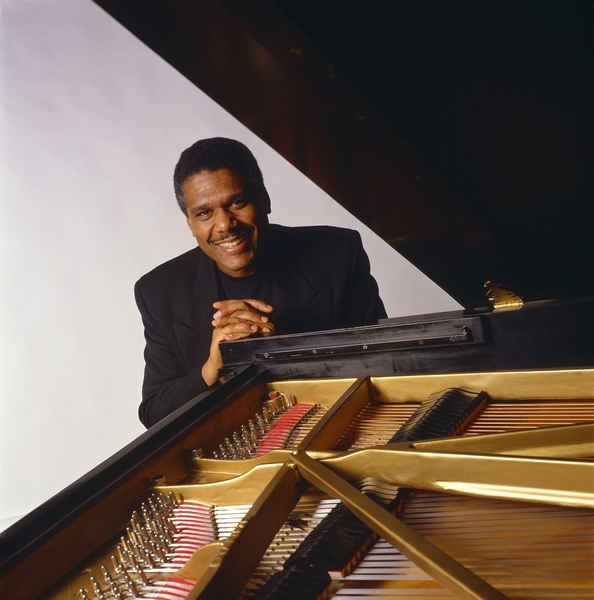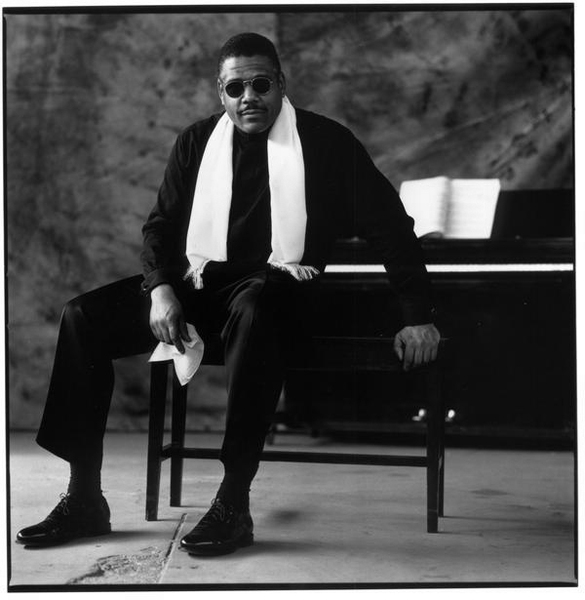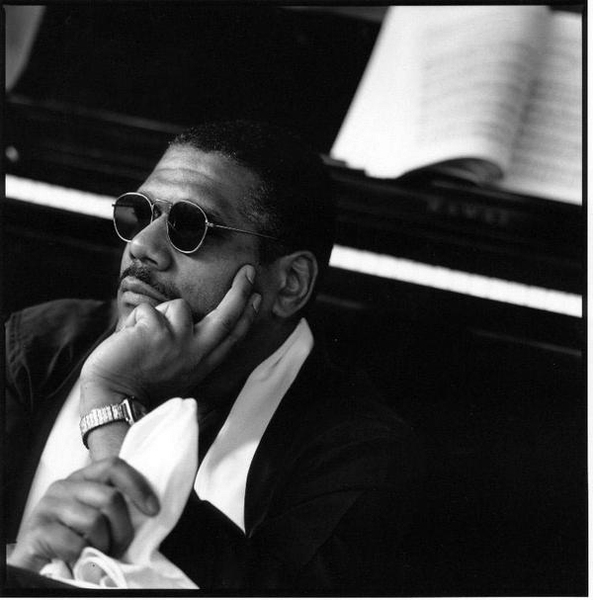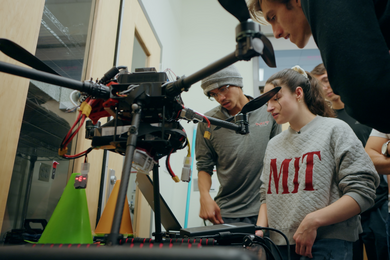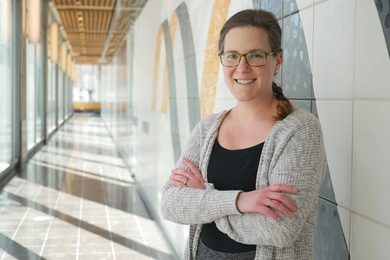Donal Fox, Martin Luther King Jr. Visiting Artist at MIT for the 2009-2010 academic year, is internationally acclaimed for fusing classical music, jazz and improvisatory technique in his piano playing.
"Donal Fox occupies a unique position in contemporary music, not so much because he straddles the line between jazz and concert music, but because he includes improvisation in both genres with equal enthusiasm and expertise," said Peter Child, professor of music in the School of Humanities, Arts, and Social Sciences.
In Fox's new Music and Theater Arts class in musical improvisation, MIT students are examining relationships between improvisation, composition and performance from a score.
"The results have been amazing," Child said, noting that class enrollment has exceeded expectations. "It's been delightful to watch Donal become increasingly engaged with our talented and unusual students, and the perspective of total immersion in music that he brings to the classroom is important and refreshing for them."
Fox applauds the commitment of his students. "The fascinating and challenging thing about my class is how wide-ranging it is," he said, noting that the springboard for his course material is the music the students used for their auditions. The musical interests are wide, he said, including classical, jazz, pop, world music, electronic, Klezmer, Afro-Cuban and any other musical genres that come up in discussion.
On October 10, Fox exemplified his subject matter in performing two sets with his quartet at the Regattabar in Cambridge. Among the 20 MIT students who took advantage of free tickets purchased through the Council for the Arts excursion series was Anne Goldberg, a cross-registered Wellesley senior who's taking Fox's improv class. Goldberg appreciates what she calls Fox's holistic approach.
"He really has shown me, through his performance at the Regattabar and through daily classroom experiences, that my growth as a musician is dependent on all aspects of my life, and that music draws upon the whole person, not simply on a series of exercises in a practice room."
As an example, Goldberg recounted an activity Fox conducted with the class, in which the students listed various emotions, which they transmuted into vocal sounds to be translated to their respective instruments. She called these exercises "tools to get in touch with our inner voices," adding that the students made some "incredibly expressive sounds by imitating our intuitions."
Classmate Paula Te, a senior in mechanical engineering and industrial design, has been interested in musical improvisation since she was a 14-year-old violinist in a church band, where her sheet music consisted of chords above a lyric sheet. "That was my first exposure to the world of improvisation, using my creativity and what musical sense I had to make up melodies on the spot," she recalled, relishing the chance to actually learn about improvisation from Fox.
This fall, in addition to a performance as a guest artist with MIT's Festival Jazz Ensemble on Saturday, November 14, where he will demonstrate some of his musical ideas with solo piano and small student ensemble pieces, he is planning for the world premiere performance of Peace Out for Improvised Piano and Orchestra, a work that will showcase his signature method of pairing an improvised solo part with notated orchestral writing, at Carnegie Hall's Zankel Hall.
Peace Out will be part of an American Composers Orchestra program titled "Traditions and Transmigrations," with Orchestra Underground. The concert is on Nov. 30, at 7:30 p.m., and tickets, which range from $38-$48, can be purchased at CarnegieCharge at: 212-247-7800, or visit www.carnegiehall.org.
"Donal Fox occupies a unique position in contemporary music, not so much because he straddles the line between jazz and concert music, but because he includes improvisation in both genres with equal enthusiasm and expertise," said Peter Child, professor of music in the School of Humanities, Arts, and Social Sciences.
In Fox's new Music and Theater Arts class in musical improvisation, MIT students are examining relationships between improvisation, composition and performance from a score.
"The results have been amazing," Child said, noting that class enrollment has exceeded expectations. "It's been delightful to watch Donal become increasingly engaged with our talented and unusual students, and the perspective of total immersion in music that he brings to the classroom is important and refreshing for them."
Fox applauds the commitment of his students. "The fascinating and challenging thing about my class is how wide-ranging it is," he said, noting that the springboard for his course material is the music the students used for their auditions. The musical interests are wide, he said, including classical, jazz, pop, world music, electronic, Klezmer, Afro-Cuban and any other musical genres that come up in discussion.
On October 10, Fox exemplified his subject matter in performing two sets with his quartet at the Regattabar in Cambridge. Among the 20 MIT students who took advantage of free tickets purchased through the Council for the Arts excursion series was Anne Goldberg, a cross-registered Wellesley senior who's taking Fox's improv class. Goldberg appreciates what she calls Fox's holistic approach.
"He really has shown me, through his performance at the Regattabar and through daily classroom experiences, that my growth as a musician is dependent on all aspects of my life, and that music draws upon the whole person, not simply on a series of exercises in a practice room."
As an example, Goldberg recounted an activity Fox conducted with the class, in which the students listed various emotions, which they transmuted into vocal sounds to be translated to their respective instruments. She called these exercises "tools to get in touch with our inner voices," adding that the students made some "incredibly expressive sounds by imitating our intuitions."
Classmate Paula Te, a senior in mechanical engineering and industrial design, has been interested in musical improvisation since she was a 14-year-old violinist in a church band, where her sheet music consisted of chords above a lyric sheet. "That was my first exposure to the world of improvisation, using my creativity and what musical sense I had to make up melodies on the spot," she recalled, relishing the chance to actually learn about improvisation from Fox.
This fall, in addition to a performance as a guest artist with MIT's Festival Jazz Ensemble on Saturday, November 14, where he will demonstrate some of his musical ideas with solo piano and small student ensemble pieces, he is planning for the world premiere performance of Peace Out for Improvised Piano and Orchestra, a work that will showcase his signature method of pairing an improvised solo part with notated orchestral writing, at Carnegie Hall's Zankel Hall.
Peace Out will be part of an American Composers Orchestra program titled "Traditions and Transmigrations," with Orchestra Underground. The concert is on Nov. 30, at 7:30 p.m., and tickets, which range from $38-$48, can be purchased at CarnegieCharge at: 212-247-7800, or visit www.carnegiehall.org.
